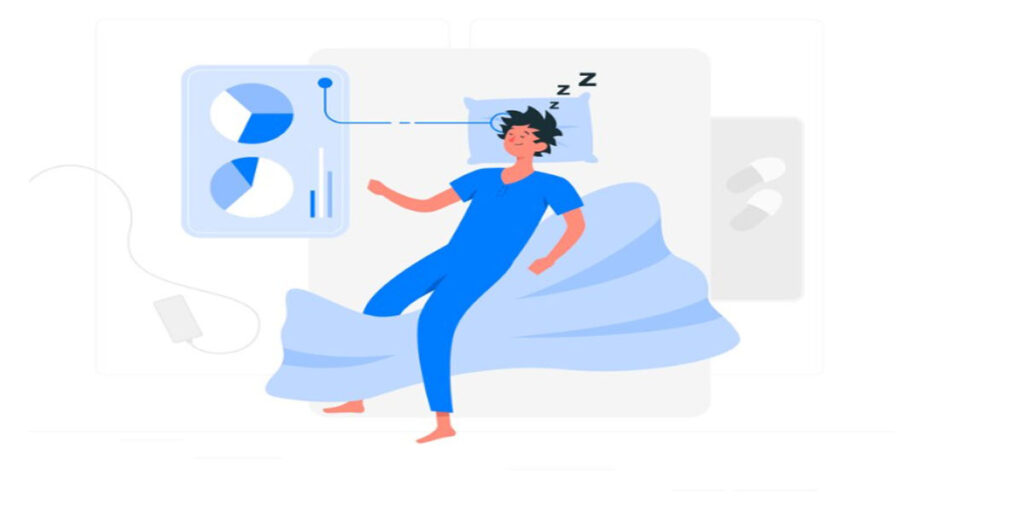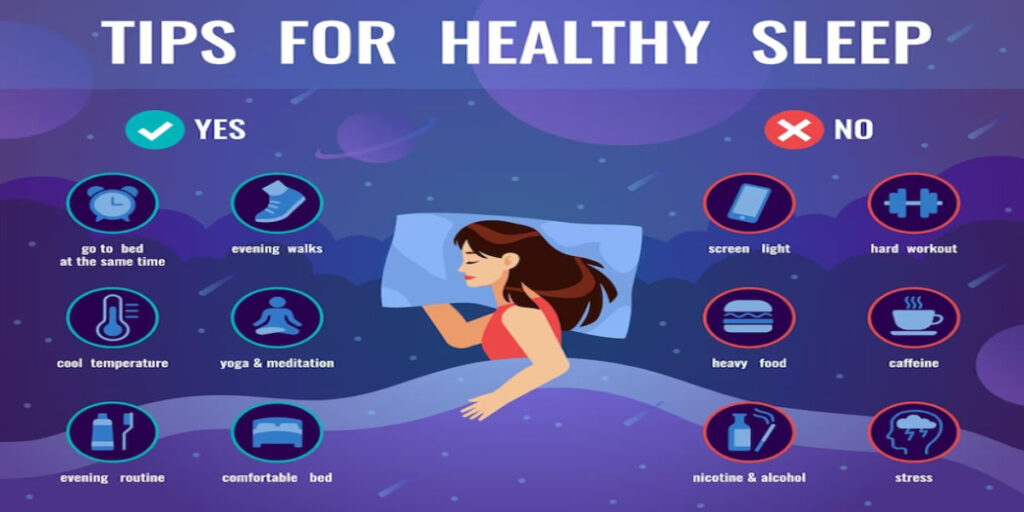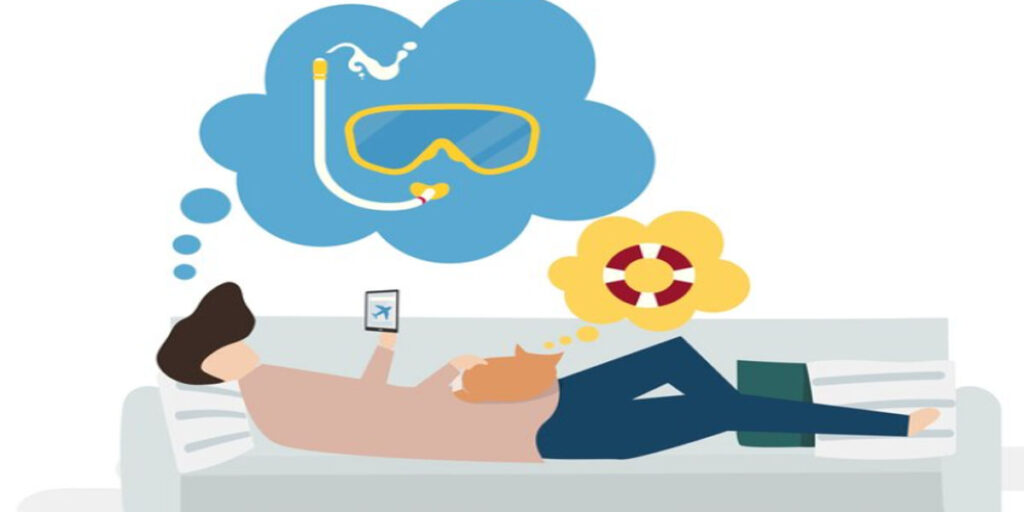In the hustle and bustle of our daily lives, the significance of nice relaxation frequently takes a backseat. The question lingers: “How much sleep do I need?” This article explores the balance between quality and quantity of sleep. Explore sleep levels, and deprivation effects, and calculate your ideal sleep duration with us. Let’s prioritize sleep quality for optimal rejuvenation.
Determining Your Sleep Needs

- Factors Influencing Individual Sleep Requirements:
Understanding your ideal sleep involves identifying the various factors that affect the quantity of rest your body requires. Age, lifestyle, pressure ranges, and normal fitness play pivotal roles in shaping people’s sleep styles. Younger people may additionally need more hours of sleep as compared to adults, and factors like strain or bodily pastimes can also impact your sleep necessities. By acknowledging those impacts, you can tailor your sleep routine to align with your particular needs.
- The Role of Age in Sleep Patterns:
Age is a critical determinant of know-how and adapting sleep styles. Infants and youngsters usually require greater hours of sleep to guide growth and development. As we transition into maturity, the encouraged hours may additionally decrease, but the importance of satisfactory sleep remains constant. Older adults would possibly enjoy modifications in sleep architecture, emphasizing the need for a nuanced approach to sleep as we age. Recognizing how age shapes our sleep necessities empowers us to make informed choices for a more balanced and restful lifestyle.
Understanding Sleep Cycles
- Exploring the Stages of Sleep
Sleep is a dynamic process comprising wonderful stages, each serving a unique purpose in maintaining normal well-being. The sleep cycle consists of two principal levels: REM (rapid eye movement) and non-REM. Non-REM sleep similarly divides into three stages, with every degree conserving unique functions.
NREM Stage 1:
This is the transitional segment between wakefulness and sleep, lasting a few minutes. It lays the foundation for deeper sleep.
NREM Stage 2:
A barely deeper level, wherein coronary heart rate and frame temperature are lower. This segment prepares the frame for more profound restorative sleep to come back.
NREM Stage 3:
Often referred to as deep sleep or gradual-wave sleep, this level is essential for physical recovery, immune characteristics, and memory consolidation.
REM Stage: This is where maximum brilliant dreaming happens. While the frame experiences muscle paralysis, the brain is fantastically active, contributing to cognitive functions and emotional regulation.
Why REM and deep sleep matter:
Both REM and deep sleep are important for maintaining the most effective health. REM sleep is associated with cognitive features, memory consolidation, and emotional well-being. Deep sleep, however, is vital for bodily recuperation, including muscle restoration and hormone release. Striking stability between those ranges ensures a comprehensive and rejuvenating sleep cycle, contributing to normal energy and intellectual acuity. Understanding the significance of each degree empowers people to prioritize not just the amount but also the quality of their sleep.
Effects of Sleep Deprivation
- Consequences on Physical Health:
Sleep deprivation will have profound effects on diverse aspects of bodily fitness. One of the immediate influences is a weakened immune system, making the body more susceptible to illnesses. Chronic sleep deprivation has been connected to an expanded hazard of situations, along with obesity, diabetes, and cardiovascular diseases. The body’s capacity to alter hormones, in particular those related to stress and appetite, is disrupted, contributing to metabolic imbalances. Additionally, prolonged sleep deprivation can impair motor abilities and coordination, posing dangers in day-by-day sports.
- Impact on Emotional and Mental Well-being:
The toll on mental health from inadequate sleep is sizable. Sleep deprivation is closely associated with temper disturbances, heightened irritability, and an extended danger of growing anxiety and melancholy. The cognitive effects are similarly sizeable, with impaired concentration, reminiscence lapses, and reduced universal cognitive performance. Chronic sleep deprivation might also contribute to long-term mental health issues, emphasizing the important link between pleasant sleep and emotional well-being.
Understanding these physical and intellectual consequences underscores the significance of prioritizing a consistent and enough sleep routine. Recognizing the broader impact on health serves as a compelling motivator to deal with and improve sleep habits for a more balanced and resilient existence.
Calculating Your Ideal Sleep Duration
- Strategies for Estimating Personal Sleep Needs:
Determining your perfect sleep length entails thinking about various factors, such as age, way of life, and personal preferences. While well-known tips exist, which include the recommendation of 7-9 hours for adults, it’s vital to pay attention to your body’s signals. Experiment with extraordinary sleep periods to identify the amount that leaves you feeling refreshed and alert during the day. Pay attention to your electricity ranges, mood, and overall cognitive characteristics after distinct amounts of sleep, and regulate your habits as a result.
- Addressing Sleep Debt:
Accruing sleep debt, a result of consistently no longer getting enough sleep could have cumulative bad effects on health. If you find yourself always sleep-deprived during the week, it is important to prioritize catching up on sleep during the weekends or on different days off. However, the purpose ought to be to set up a constant sleep routine that lets you satisfy your sleep desires on a nightly basis, minimizing the need for compensatory measures.
By adopting a proactive approach to calculating your ideal sleep period, you take a great step closer to optimizing your general well-being. Recognizing and meeting your frame’s specific sleep requirements sets the muse for sustained energy, advanced cognitive function, and more advantageous emotional resilience.
Tracking and Improving Sleep Quality

- Importance of Sleep Quality:
While the period of sleep is vital, the rest of the sleep is similarly full-size. Quality sleep ensures that the time spent on the mattress is restorative and contributes to normal well-being. Poor sleep quality, characterized by common awakenings, restlessness, or disruptions in sleep cycles, can lessen the benefits of sleep. Monitoring and improving sleep are vital factors in the pursuit of a rejuvenating night’s relaxation.
- Monitoring and Enhancing Your Sleep Environment:
Creating top-rated sleep surroundings is paramount for enhancing sleep satisfaction. This includes addressing factors consisting of mildness, noise, and temperature. Dimming the lighting in the evening alerts your body that it’s time to wind down. Minimizing noise disruptions and retaining a snug room temperature contributes to surroundings conducive to deep and uninterrupted sleep. Additionally, making an investment in a comfortable bed and pillows that offer good enough help complements typical sleep.
By being aware of your sleep environment and actively working to improve it, you pave the way for extra restful nights. Techniques such as organizing a constant bedtime, lowering display time earlier than sleep, and practicing rest sporting activities contribute to a holistic technique in improving the exceptional of your sleep. Recognizing the interplay between sleep duration and satisfaction positions you to free up the whole blessings of a revitalizing night’s relaxation.
Tips for Better Sleep

- Daytime Practices for Improved Sleep:
Regular Exercise: Engaging in bodily hobbies at some point in the day can promote better sleep. Aim for a minimum of 30 minutes of mild exercise on the maximum days of the week.
Sunlight Exposure: Exposure to herbal sunlight allows you to adjust your body’s inner clock. Spend time outside throughout the day, particularly in the morning.
Mindful Eating: Avoid heavy food near bedtime, and restrict caffeine and nicotine intake in the hours main as much as sleep.
- Preparing for Bedtime:
Establish a Relaxing Routine: Create a calming pre-sleep ordinary to sign in your body that it is time to wind down. This may want to encompass sports like studying, gentle stretching, or working towards relaxation strategies.
Limit Screen Time: Reduce publicity to displays at least an hour earlier than bedtime. The blue light emitted from digital gadgets can intervene with the production of the sleep hormone melatonin.
Create a Comfortable Sleep Environment: Ensure your bedroom is conducive to sleep by keeping it cool, dark, and quiet. Invest in cushy bedding and a supportive bed.
- In Bed:
Limit Naps: If you want to nap at some point of the day, hold it brief (20-half-hour) and avoid slumbering too near bedtime.
Use Your Bed for Sleep Only:
Train your body to companion your bed with sleep through heading off work or other stimulating sports on the mattress.
Mindfulness and Relaxation Techniques: Practice relaxation strategies along with deep respiration, meditation, or revolutionary muscle rest to quiet the thoughts and sell a sense of calm.
By incorporating these tips into your daily ordinary, you can create a sleep-friendly way of life that supports each amount and great of your sleep. Developing healthy sleep habits is a proactive step in the direction of ensuring restful nights and progressing in basic well-being.
Health Implications of Sleep

- Connection Between Sleep and Chronic Inflammation:
Chronic inflammation is more and more recognized as a key contributor to diverse health troubles, including coronary heart disease, diabetes, and autoimmune issues. Adequate sleep plays a vital role in modulating infection. Sleep deprivation or poor sleep can trigger an inflammatory response within the body, probably contributing to the development or exacerbation of inflammatory conditions. Understanding this connection underscores the significance of prioritizing sufficient and extraordinary sleep for common health.
- Adapting Sleep Patterns for Overall Well-being:
Recognizing the impact of sleep on inflammation highlights the need to conform to sleep patterns to maintain our usual well-being. Establishing a regular sleep schedule, developing a conducive sleep environment, and incorporating relaxation techniques into your routine can contribute to better sleep. These proactive measures no longer decorate your daily functioning but additionally, function as protective factors against the unfavorable effects of persistent infection.
Understanding the broader fitness implications of sleep emphasizes its position as a foundational pillar of proper being. By prioritizing and optimizing your sleep, you contribute to a more fit and resilient body, better equipped to beat back the demanding situations of inflammation and aid lengthy-term fitness.
FAQs approximately Sleep
1. How does the sleep requirement change with age?
As we age, our sleep patterns obviously evolve. While toddlers and children need more sleep for boom and development, adults may additionally discover their sleep length decreases. However, the great of sleep remains crucial across all age agencies.
2. Is it wholesome to sleep at some stage in the day?
Short daytime naps may be beneficial for a few individuals, selling alertness and overall performance. However, excessively lengthy or irregular snoozing may imply an underlying sleep difficulty and ought to be addressed.
3. Why am I nevertheless worn out after napping for 8 hours?
Feeling tired despite a complete night’s sleep might be attributed to different factors, including terrible sleep quality, sleep disorders, or lifestyle factors. Assessing the overall sleep environment and behavior can help perceive and address the root cause.
4. Does your need for sleep alternate with age?
Yes, sleep wishes do change with age. While the encouraged hours might also lower in maturity, the importance of consistent and great sleep remains important for normal health and well-being.
Navigating these frequently requested questions affords clarity on not-unusual issues associated with sleep. Understanding the nuances of sleep necessities and addressing a man or woman’s challenges empowers people to make informed decisions for a more restful and rejuvenating night’s sleep.
conclusion
Moreover, the discussion on the health implications of sleep shed light on the connection between sleep and persistent irritation, emphasizing the desire to conform to sleep styles for universal well-being.
Frequently requested questions provided clarity on commonplace queries, making sure a comprehensive understanding of sleep needs across exceptional levels of lifestyles.
In the end, the pursuit of restful sleep includes a conscious and proactive technique. By acknowledging the factors influencing your sleep, implementing guidelines for higher sleep, and providing information on the wider fitness implications, you equip yourself with the know-how to make informed choices for a revitalizing night’s rest. May your journey towards the most suitable sleep be filled with nights of rejuvenation and proper well-being.


